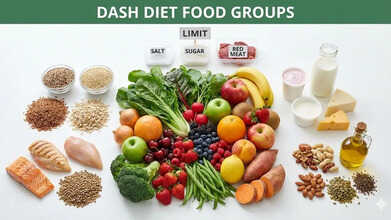- Health Conditions A-Z
- Health & Wellness
- Nutrition
- Fitness
- Health News
- Ayurveda
- Videos
- Medicine A-Z
- Parenting
How Fasting and Moderation During Diwali Can Be Healthy? Yogic Approach

How Fasting and Moderation During Diwali Can Be Healthy? Yogic Approach
Diwali, the grand Indian festival of lights, is celebrated all over the world and is known as an occasion for feasting. In olden times, fasting or eating in moderation was observed during Diwali to do self- reflection and attain spiritual purification. This sacred time encourages us to contemplate our thoughts and actions. Fasting and eating in moderation is important in our traditions as a personal act of devotion and introspection.
Common fasting practices during Diwali
- Fasting Days: Some fast for a single day, while others observe fasting for multiple days, often linked to specific deities and cultural significance.
- Partial Fasting: Involves abstaining from grains while consuming water, milk, fruits, and vegetables.
- Waterless Fast: The most intense form of fasting which involves abstaining from both food and water from sunrise to sunset.
- No Onion and Garlic: Avoiding onion and garlic, to maintain a pure state of mind.
The Yogic Diet
The practice of fasting during Diwali is connected to the concept of Ahara or food in yoga.
Ahara, or diet, is one of the four tenets of yoga and reflects our Swadharma or duty to ourselves and therefore, rigorous fasting such as waterless fasting is not advised in yoga.
Yogis emphasize the importance of being mindful about the food we consume—whether we overindulge, eat too little, or choose the wrong types of food.
Mitahara or Moderation in Eating
Following is the yogic concept of Mitahara or the practice of eating in moderation, which is akin to the principles of fasting during Diwali.
- Fill half the stomach with solid food.
- One-quarter should be reserved for water.
- Leave the remaining quarter empty for the movement of air and gases.
- This method allows for efficient digestion and prevents overburdening the digestive system.
The Three Types of Food
In yoga, food is classified into three categories, based on the three gunas or qualities of nature:
Sattvic: Fresh, light, and natural foods that are easily digestible and bring clarity and balance. Examples include milk, seasonal vegetables, fruits, cereals (wheat, unpolished rice), pulses (moong dal), honey, jaggery, and herbs like ginger and cumin.
Rajasic: Foods that are stimulating and increase activity but can lead to restlessness if consumed in excess.
Tamasic: Heavy, stale, or processed foods that promote lethargy and dullness.
Eating sattvic foods and staying hydrated are the basic rules for fasting on Diwali.
Eating with Awareness: A very important aspect of the yogic diet is the state of mind while eating.
Mauna: Practicing mauna or silence while eating brings awareness, encouraging one to be present and fully aware of the process of eating.
Distractions like watching television while eating can lead to overeating and negative emotions, which disrupt digestion.
Creating a Positive Atmosphere: It’s important to consciously generate a happy and peaceful environment during meals. Avoid focusing on likes and dislikes. Instead, approach food with gratitude and a calm mind.
Fasting and eating in moderation during Diwali has more than just physical benefits. It is a practice that aligns with the yogic traditions that encourage us to purify our bodies and to grow spiritually. Diwali is a festival that leads us from darkness to light and eating lightly helps us to walk on this illuminated path with ease and grace.
WHO Asks Nations To Increase Taxes On Sugary Drinks To Reduce Diseases

Credit: Canva
The World Health Organization is asking countries across the world to increase taxes on sugary drinks and alcohol to reduce cases of chronic conditions such as Type 2 diabetes, obesity, heart disease and fatty liver.
In a January 13 virtual conference, WHO Director-General Dr Tedros Adhanom Ghebreyesus said: "Health taxes have been shown to reduce consumption of these harmful products, helping to prevent disease and reduce the burden on health systems.
"At the same time, they generate an income stream that governments can use to invest in health, education and social protection."
According to a recent report on sugar-sweetened beverages taxes, at least 116 countries tax sugary drinks, including sodas or carbonated canned drinks, but other high-sugar products, such as 100 per cent fruit juices, sweetened milk drinks and ready-to-drink coffees and teas, escape taxation.
Additionally, another report on alcohol taxes shows that even though 167 countries levy taxes on liquor, wine and beer, alcohol has become more affordable or remained unchanged in price in most countries since 2022, as taxes do not get adjusted for inflation and income growth.
How Will A Tax Increase on Drinks Help?
Regularly consuming beverages filled with added sugar or preservatives can pave the way for the development of weight gain, inflammation, insulin resistance, and metabolic dysfunction, despite regularly working out and eating a balanced diet.Apart from increasing the risk for diabetes and heart disease, sugary drinks can also worsen the risk for dental problems, gout, non-alcoholic fatty liver disease and potential kidney/bone issues.
Due to being cheap for consumption, the harmful products are generating billions of dollars in profit for countries and corporations, alike.
However, health systems across the globe are facing mounting financial pressure from preventable noncommunicable diseases and injuries and an increase an taxes will help curb these costs , the WHO said.
Moreover, high tax rates will discourage consumers from buying such drinks and causing long-term damage to their body.
Has This Approach Ever Been Successful?
Yes, the WHO noted that when the UK implemented a tax on sugary drinks in 2018, the country saw a overall reduced sugar consumption, £338 million revenue increase in 2024 and a lower obesity rates in girls aged 10 and 11, especially in deprived communities.
Are Sugary Drinks Only To Blame?
Common preservatives added to foods to prevent spoilage and increase shelf life may also be linked to a higher risk of several cancers and Type 2 diabetes, according to two new studies from France.“These are very important findings for preservatives that are not only widely used in the French and European markets, but also in the United States,” said senior author Mathilde Touvier, principal investigator of the NutriNet-Santé study used for the research, as per CTV News.
The cancer-focused study, published in The BMJ, examined the effects of 58 preservatives among nearly 105,000 people who were cancer-free in 2009 and followed for up to 14 years.
Sodium nitrite, commonly used in processed meats such as bacon, ham, and deli meats, was linked to a 32 percent higher risk of prostate cancer. Potassium nitrate was associated with a 22 percent increased risk of breast cancer and a 13 percent rise in overall cancer risk, results showed.
'Not Sure How He's Alive' Says RFK Jr About Trump's Eating Habits And Drinking Diet Coke

Credits: Wikimedia Commons, X, Facebook
US President Donald Trump’s eating habits have drawn a blunt and unusually candid assessment from Health Secretary Robert F Kennedy Jr, who described them as “unhinged” and dominated by fast food, candy, and Diet Coke.
Speaking on a podcast, Kennedy said Trump regularly consumes what he called “really bad food,” with McDonald’s, sweets, and Diet Coke forming a constant part of his routine. “The interesting thing about the president is that he eats really bad food, which is McDonald's. And then candy and Diet Coke,” Kennedy said, adding that Trump drinks Diet Coke “at all times.”
“Pumping Himself Full of Poison”
Kennedy, who has travelled with Trump, painted a vivid picture of the president’s food habits on the road. “If you travel with him, you get this idea that he's just pumping himself full of poison all day long,” he said.
Despite the criticism, Kennedy also expressed disbelief at Trump’s physical resilience. “He’s got the constitution of a deity,” he remarked. “I don’t know how he’s alive, but he is.”
Why Trump Trusts Fast Food on the Road
According to Kennedy, Trump has his own reasoning for relying on food from large corporate chains while travelling. The president, he said, believes such food is safer and more predictable.
“[Trump] says that the only time that he eats junk food is when he's on the road, and he wants to eat food from big corporations because he trusts it,” Kennedy explained. Trump reportedly worries about falling ill while travelling and prefers food he considers consistent and hygienic.
Kennedy added that Trump’s energy levels remain astonishing despite his diet. “You don’t know how he’s walking around, much less being the most energetic person any of us have ever met,” he said.
A Shift in Tone on Trump’s Health
While Kennedy’s comments about Trump’s diet were sharp, he later struck a more positive tone about the president’s overall health. He said that, in his view, Trump is in excellent physical condition and does not always eat poorly.
“I think he actually does eat pretty good food usually. He's got incredible health,” Kennedy said.
Medical Tests and ‘Exceptional Health’ Claims
Kennedy also cited a medical assessment conducted by Dr Mehmet Oz, referencing Trump’s test results. According to Kennedy, Dr Oz reviewed Trump’s medical records and found unusually high testosterone levels for someone over 70. “He’s got the highest testosterone level that he’s ever seen for an individual over 70 years old,” Kennedy said, adding that Trump would likely be pleased to hear that repeated publicly.
Last month, the White House released details of an MRI scan that described Trump as being in “excellent health.” In a memo, Trump’s physician, Navy Captain Sean Barbabella, said the president’s cardiovascular system was in excellent condition, abdominal imaging was normal, and “all major organs appear very healthy and well-perfused.”
Addressing Age and Visible Bruising
The medical disclosure came amid ongoing public scrutiny of Trump’s health, particularly as he is set to turn 80 in June and is the oldest person ever sworn in as US president.
The White House also addressed visible bruising on Trump’s right hand, explaining that it was linked to aspirin use as part of a standard heart-health regimen.
Inside Trump’s Latest Medical Report
Following a recent checkup at Walter Reed National Military Medical Center, Trump’s physician described him as being in “exceptional health.” The evaluation, which lasted roughly three hours, included lab tests, advanced imaging, and preventive health assessments as part of his ongoing health maintenance plan.
During the visit, Trump also received his annual flu shot and a Covid-19 booster vaccine.
“President Donald J. Trump remains in exceptional health, exhibiting strong cardiovascular, pulmonary, neurological and physical performance,” Barbabella wrote in a one-page memo released by the White House.
The doctor also assessed Trump’s cardiac age, noting that it appeared to be about 14 years younger than his actual age. Trump is currently 79.
Despite questions around his fast-food-heavy diet, official medical reports continue to present a picture of a president who, by clinical measures at least, remains remarkably fit for his age.
DASH Diet Found To Significantly Lower High Blood Pressure, Scientists Say

Credits: AI Generated
A diet backed by scientific research may help people slim down while also bringing down high blood pressure. For those who have been told by their GP to lose weight, there are several eating plans and everyday changes that can support steady, healthy weight loss. One well-known approach is the DASH diet, created by researchers in the United States. Designed by the National Heart, Lung, and Blood Institute to help manage blood pressure, it has previously been described as the “best heart-healthy diet” and the “best diet for high blood pressure.”
DASH Diet Found To Significantly Lower High Blood Pressure
The plan advises cutting back on salt while prioritising nutritious foods such as fruit, vegetables, and whole grains. According to nutritionist and author Robert Hobson, who wrote Unprocess Your Life, this way of eating may also support weight loss.
Speaking to Saga Magazine, Hobson explained: “The DASH (Dietary Approaches to Stop Hypertension) diet is similar to the Mediterranean diet, as it focuses on fruits, vegetables, lean protein, and keeping salt, sugar, and fat intake low. Research shows it can significantly reduce high blood pressure. Although it wasn’t created as a weight-loss plan, many people following DASH do end up losing weight.”
Many people report losing weight while following the DASH diet, particularly if they also lower their overall calorie intake. Studies suggest weight loss can range from modest to more noticeable levels, with one piece of research showing an average loss of 3.8kg in eight weeks when compared with other diets. This is often because the DASH diet centres on low-calorie foods like fruit and vegetables. Long-term commitment is key for lasting benefits, according to The Mirror.
What Is The DASH Diet?
The National Heart, Lung, and Blood Institute explains that no special or hard-to-find foods are needed to follow the DASH diet. Instead, people are encouraged to eat specific portions from each food group, based on their daily calorie requirements. The diet also stresses choosing foods that are low in saturated and trans fats, as well as lower in sodium.
DASH Diet: What Does The Plan Recommend?
- Eating plenty of vegetables, fruits, and whole grains
- Including fat-free or low-fat dairy products, fish, poultry, beans, nuts, and vegetable oils
- Limiting foods high in saturated fat, such as fatty meats, full-fat dairy products, and tropical oils like coconut, palm kernel, and palm oils
- Cutting back on sugary drinks and sweet foods
Further guidance is available online, and the British Heart Foundation also offers advice and recipe ideas for those following the DASH diet. Outlining the potential benefits, the charity notes on its website: “A large study published in 2019 in the journal Nutrients reviewed seven meta-analyses, including 15 observational studies and 31 controlled trials, on the DASH diet.
“It found the diet was associated with a 5.2mmHg reduction in systolic blood pressure, which is the top number, and a 2.6mmHg reduction in diastolic blood pressure, the bottom number.”
The NHS states that the recommended daily calorie intake is around 2,500 calories for men and 2,000 calories for women. Anyone with health concerns should always speak to their GP.
For maintaining a balanced, healthy diet, the NHS advises: “If you’re eating foods and drinks high in fat, salt, or sugar, try to have them less often and in smaller portions. Aim to eat a wide variety of foods from the five main food groups to ensure you get a broad range of nutrients.”
© 2024 Bennett, Coleman & Company Limited

